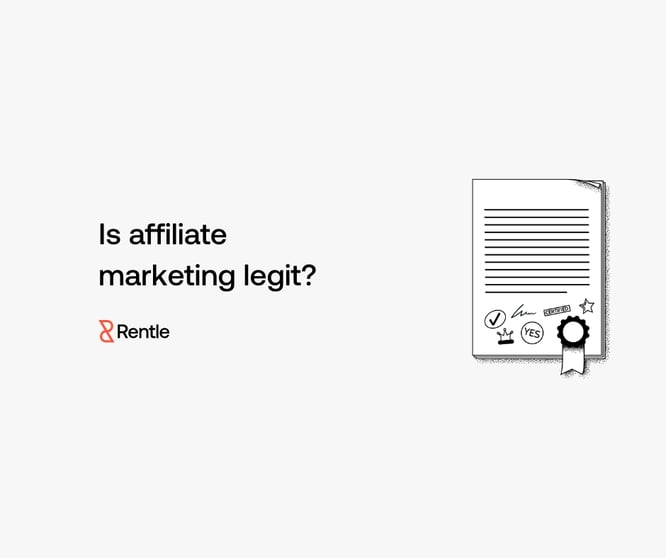Affiliate marketing keeps on growing. According to a Forrester report 81% of advertisers and 84% of publishers use affiliate marketing. And according to Statista, affiliate marketing spending in the U.S. alone is expected to reach $8.2 billion by 2022.
These metrics reveal that in general affiliate marketing is legit and used by both large publisher and advertisers. But as always, when there is money involved, there are bad actors and scams.
Let's go through opportunities and risks for affiliate marketers, the audience who consumes content on the internet and for the companies running affiliate programs.
Opportunities and risks for affiliate marketers
There are ever increasing number of successful affiliate marketers who are making money online. To create successful affiliate marketing business yourself, you have to find real, legitimate, and high-quality companies whose affiliate programs you want to join. The largest risk for an affiliate marketer is fake products through false programs.
Opportunities for affiliate marketers
Affiliate marketing offers a great way for content creators to make money online. In practice, it is super easy to start affiliate marketing. It usually requires filling a short affiliate partner application, which is of course more likely accepted if you have well established business with existing audience.
Most affiliate programs pay good commissions and enable you to earn money online, they won't make you millionaire overnight. The earnings depend on the size of your audience and how well the affiliate products fit the audience. Building an audience takes time, so new affiliate marketers might not make any money for a while.
Affiliate marketing can provide similar passive income to display ads, which usually only work for large published with huge audiences, as they usually pay only few dollars per thousand visitors (CPM) at best, while affiliate marketing can bring in significantly more per audience size.
The difference is that affiliate marketing pays based on the conversions the affiliate brings to the company running the affiliate program. This is called performance marketing, as the commission is tied to the actual performance; more conversions = more commissions.
Depending on the affiliate program, one conversion can bring anything from few dollars to hundreds of dollars. And if the conversion rate is significant, earnings per thousand visitors can be significantly higher compared to display ads.
The key to run a successful affiliate marketing business is to promote products and services which match your audiences' interests. By promoting products and services, which are highly relevant to the readers (or viewers or listeners), affiliate websites can generate a lot of revenue, even with relatively small audiences. So, make sure you select affiliate programs, which match your audience.
Risks for affiliate marketers
The biggest risks for affiliate marketers are to promote fake products or services.
Creating quality content takes a lot of effort and time. Spending your efforts to promote affiliate products which doesn't result in affiliate commissions is waste of time. And even more importantly, promoting fake products, or low-quality products, to your audience is a sure way to lose the trust, which makes your future (quality) content resonate less.
One great way to assess if an affiliate marketing program is legit, is to be alerted if it sounds too good to be true. If an affiliate program promises to pay huge commissions which are a lot higher than the industry average is usually a bad sign. Another warning sign are pay to join programs. If the affiliate program is trying to get money from you, it doesn't sound like an affiliate program at all, but rather an affiliate scam. Joining an affiliate program should be completely free.
Another risk is to promote products or services, which are legit and good quality, but do not match with your audiences' interests. I am confident you have also watched a YouTube video where the sponsor of the video has nothing to do with the topic you are came for, leaving you in a search for the exit or even unsubscribe buttons.
How to avoid affiliate marketing scams
To avoid affiliate fraud, you should always do proper research before you join an affiliate marketing program. You should look up the company in other media to see if the company is legit. For example, news related to funding rounds in trusted medias are a great way to increase the confidence of the brand (Rentle raised 3,8 million seed round ;)
If you can't find any third party media sources about the company, you can always check reviews on third party sites, like Capterra or Trustpilot. But again, make sure that the reviews you find are not fake customer reviews. Credible affiliate programs can usually be found also on affiliate marketing databases found online.
Opportunities and risks for companies running an affiliate program
For companies running an affiliate program, affiliate marketing can be a significant part of their overall digital marketing strategy. Running an affiliate marketing program allows the company to scale the touch points where potential customers can be reached very efficiently. But, as we already established, there are always downsides. For companies running affiliate programs, the risks are mostly related to the quality of the affiliate marketers they can recruit.
Opportunities for companies
For many companies, affiliate marketing works great. Depending on the industry, it can even be the main digital marketing channel. It allows companies to scale their online marketing to all channels, where there are content creators and so be in the cutting edge of new channels, such as new social networks.
As affiliate marketing is performance marketing, which means the commission is only paid on conversions, the risk of spending money without any return is slim to none. Of course, affiliate commissions can be adjusted too high and not see any positive returns in case of refunds on sales where the affiliate commission is already paid.
In general, for any online business, affiliate marketing can be a great opportunity to increase revenue and get more visibility.
Risks for companies
The biggest risk for companies running affiliate marketing programs is the quality of the affiliate partners they recruit. While most affiliate marketers are legit and respect the guidelines and contracts, there are always bad actors looking to make easy money online.
The larger the affiliate program, the larger the chance of recruiting bad actors. As the absolute number of affiliates rise, it gets harder and harder to keep track of the affiliates and what kind of content they create.
Affiliate marketer can also try to trick the audience to click the affiliate link without even realizing it, and so getting the unearned commission on future purchases. These types of affiliate marketing scams are almost always forbidden in the contracts but enforcing the rules can be a difficult task. While this usually doesn't lead to bad feedback from the customer as they might not be even aware of having an affiliate cookie in their browser, it does lower the margins.
Another risk for companies running an affiliate marketing program, are affiliate marketers who use ppc ads and compete for the same keywords, which in turn rises the advertising costs. Again, this is something that should be clearly forbidden on terms and conditions the affiliate marketer must accept to join the program.
How to avoid low quality affiliates?
The best way to avoid low quality affiliate marketers is to review each applicant. This means checking that the affiliate exists and that they own the media they are using to promote the affiliate campaigns. Some affiliate networks tackle this by requiring the affiliate to install small snippet on their website to validate that they really do own the media.
Besides reviewing each affiliate, it is crucial to have comprehensive contracts, which allow the company to remove the affiliate from the program if they break any rules. Contracts can include also minimum number of referrals per certain time to make sure there are no affiliates, who are not active.
Affiliate marketing managers should also monitor the affiliate traffic. If an affiliate site sends traffic which has significantly higher conversion rates compared to other affiliate sites, especially if it only sends low amount of traffic, the risk of an affiliate scam is high. Overall, it is good to monitor if the traffic comes from the affiliate website the affiliate signed up with.
There are also straight up affiliate marketing fraud happening. Usually this focuses on affiliate marketing programs which pay a higher commission, than the product or service costs at minimum. For example, if the affiliate commission is $50, for a subscription service, which costs $10 a month, a scammy affiliate marketers might recruit their friends to sign up using their affiliate link, pay for one month, cancel and bank $40.
Opportunities and risks for the audience consuming the content
As a citizen of the internet, affiliate marketing is all around you. It enables a lot of content creators to create quality content for you to enjoy, but at the same time it brings a huge question on how trustworthy the content is. When the content creator is paid on bringing in new customers, they are more inclined to suggest the product or service and give good reviews.
Opportunities for the audience
The main opportunity for the audience consuming the content on the internet is to find quality information to help on purchase decisions. Sites like WireCutter and Rtings are great sources for product reviews, which monetize their content through affiliate programs. Both sites are very transparent how they review the products and when the links are affiliate links.
Another opportunity is to find great deals. Some affiliate programs include coupon codes or other type of promotions, which can lower the price you pay.
Risks for the audience
The largest risk for the content consumers is trust. If the content creator is being paid by the company whose product or service they are recommending or reviewing, how can you know if they are honest. The incentive to talk about the product or service in a good light is quite large, when it determines how much money the affiliate marketer makes.
In some cases, the audience might not even realize they are browsing through an affiliate marketing website. It is always bad sign if you notice that the site contains affiliate links, but there are no disclaimers about that. Some scammy affiliate marketers might also build fake website, which mimics another, trustworthy website, to trick you to click their affiliate link.
Dishonesty is not unique to affiliate marketing. This can be found in any type of influencer marketing. While influencers who receive one-time-commission for a campaign don't earn money based on the number of conversions, they can be more inclined to show the product or service in positive light, as they want to get new deals from the same or another company. In some cases, the brands might even be part of the content creation and determine the exact words the influencer uses.
Another risk, which usually doesn't lead to any direct costs to you as the audience, are affiliate scams using fake ads. The most common affiliate marketing scams are related to coupon or other advertisements where you are promised a great discount, but they just want you to click their affiliate link. This might not cost you money, but it does cost you time and frustration as you didn't get what you were promised and enables these common affiliate scams to continue.
Another common affiliate marketing scam is related to malware. Some bad actors use malware to do google ad hijacking, where they change the links, you press to include their affiliate links. So, while, you end up to the right place, there might be a malware doing some affiliate marketing work for bad actors.
How to avoid affiliate marketing scams as a content viewer
Easiest way to avoid affiliate marketing scams is to avoid anything that sounds too good to be true. Easy way to spot affiliate scams is to at the link URL and see if there are any disclaimers that the site includes affiliate links.
Transparency is always good sign. Many legit affiliate marketers tell exactly where there are affiliate links and what kind of say the brand has on the content. Many YouTubers and podcasters do great job being transparent about the sponsors or affiliate links. This is in part due to the format, as video or audio don't contain any links, but they are found on descriptions or show notes.
Conclusion
In general, the affiliate marketing industry is legit. But as it might be legitimate business in general, there are always bad actors when there is an opportunity to "get rich quick".
If you are looking for a great affiliate program, which not only earns you income ($100 per conversion!) but enables more sustainable commerce - you should check out Rentle's affiliate program.









